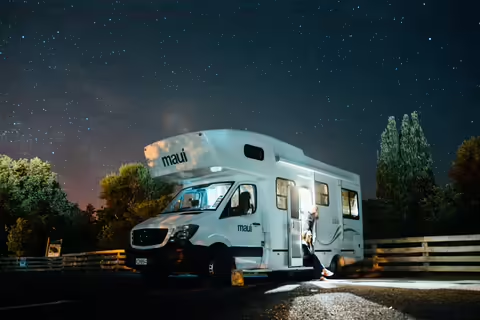SPRINGFIELD, Ill. – Camping remains one of the best ways to get away from daily routines while practicing social distancing. Portable generators offer some comforts of home, whether your camping adventure includes tents or recreational vehicles.
“There are steps you can take to keep yourself and your family safe when enjoying some time outside while using a generator,” explains Erin Hollinshead, University of Illinois Extension Safe Electricity executive director and director of the Energy Education Council. “An easy step is to take a carbon monoxide detector with you.”
Mount the detector permanently inside the vehicle and check it regularly. If a rental vehicle doesn't have a detector, bring one with you.
Practice these safety tips while using portable generators:
- Inspect the RV chassis and generator exhaust system regularly and before each outing, after bottoming out, or after any other incident that could cause damage.
- Inspect the RV for openings in the floor or sidewalls. Seal any holes with silicone adhesive before using the generator.
- Inspect windows, door seals, and weather strips to ensure they are properly sealed.
- Do not operate the generator if the exhaust system is damaged in any way or if an unusual noise is present.
- Park the RV so the exhaust may easily dissipate away from the vehicle. Do not park next to high grass or weeds, snow banks, buildings, or other obstructions that might prevent exhaust gases from dissipating properly.
- Be vigilant in monitoring wind shifts that may cause exhaust to blow away from the coach one moment and under the coach the next.
- When stopping for long periods of time, be aware of other vehicles nearby, such as tractor-trailers at rest stops, that may have their engines and refrigerators running.
- Do not sleep with the generator operating.
- Leave a roof vent open anytime the generator is running, even during the winter.
"If you do not feel well, do not be fooled into thinking that it is because you have been driving too long, ate too much, or are suffering from motion sickness," Hollinshead says. "Shut off the generator and step outside for some fresh air."
Tent camping doesn't mean one is unaffected by carbon monoxide. Many modern tents are air tight and if you are operating a generator nearby, the fumes can get trapped inside and the consequences could be dire, Hollinshead says.
The Mayo Clinic lists symptoms of carbon monoxide poisoning: a dull headache (the most common early symptom), weakness, dizziness, nausea, vomiting, chest pain, confusion, irritability, impaired judgment, and loss of consciousness. Get fresh air immediately and seek medical attention, Hollinshead says.
For more information on staying safe around generators and electricity, visit SafeElectricity.org.
SOURCE: Erin Hollinshead, Executive Director, Safe Electricity
ABOUT EXTENSION: Illinois Extension leads public outreach for the University of Illinois by translating research into action plans that allow Illinois families, businesses, and communities to solve problems, make informed decisions, and adapt to changes and opportunities.
ABOUT SAFE ELECTRICITY: Safe Electricity is the award-winning, public awareness program of the Energy Education Council, a 501(c) 3 (not-for-profit organization) established in 1952 on the campus of the University of Illinois at Urbana-Champaign. With offices located in Springfield, Ill., Safe Electricity operates under the University of Illinois Extension and is led by the EEC Board of Directors. Since the Safe Electricity program was created in 2001, it has provided thousands safety-minded resources to its more than 500 utility members from across the country to help save lives and reduce injuries.
